Add these heart-healthy foods to your everyday diet and your ticker will thank you—for decades to come.
The 50 Best Foods for Your Heart
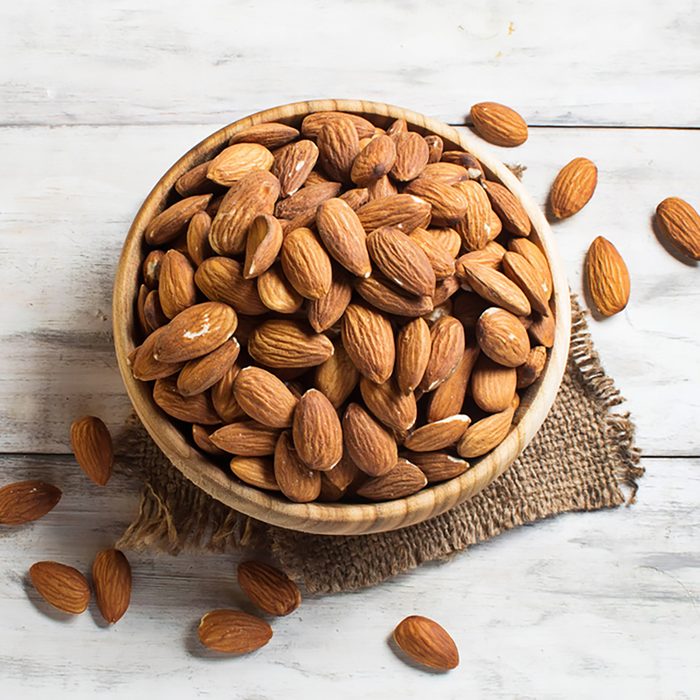
Almonds
Vitamin B2 (riboflavin), vitamin E, magnesium and zinc all help to make a handful (about 1/4 cup a day) of crunchy almonds good for your heart and your mood. B vitamins and magnesium help produce serotonin, which helps regulate mood. Zinc has also been shown to fight some negative effects of stress, while vitamin E is an antioxidant that destroys the free radicals related to stress and heart disease. Here are 40 ways to enjoy almmonds—from sweet to salty.
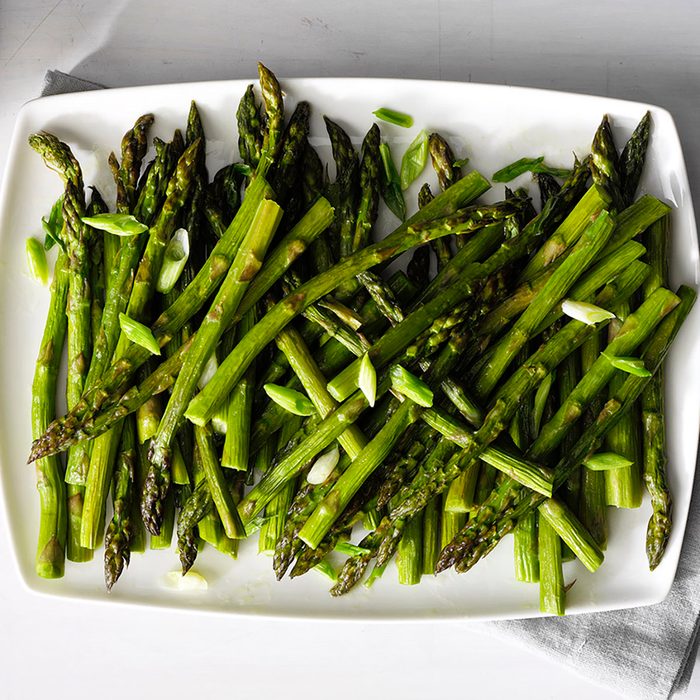
Asparagus
Asparagus contains heart-healthy anti-inflammatory nutrients like folate and vitamins C and D. It is also low in calories and quick cooking. Sauté it with sugar snap peas and toss with whole wheat pasta, olive oil, lemon juice and a bit of freshly grated Parmesan cheese and pepper for a meatless meal fit for a healthy king or queen.
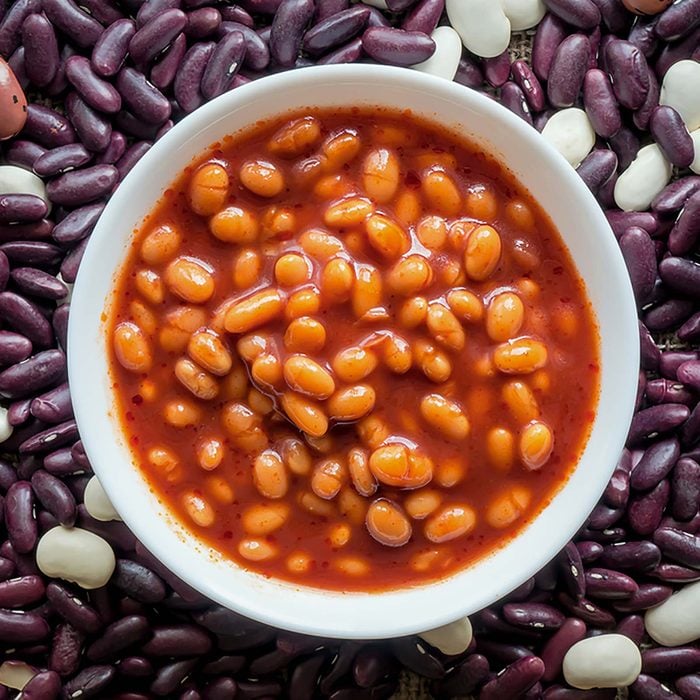
Beans
These versatile legumes contain more protein than any other plant food—just one cup provides a quarter of what we need each day. They also provide heart-healthy and stress-busting B vitamins, iron, and all-important calcium. Plus, they are considered “nature’s scrub brush” because one serving’s 15 grams of fiber goes through the intestines and sops cholesterol and takes it away (you know where). Not sure how to get more beans in your diet? Take a look at 100 delicious ways you can use a can of beans.
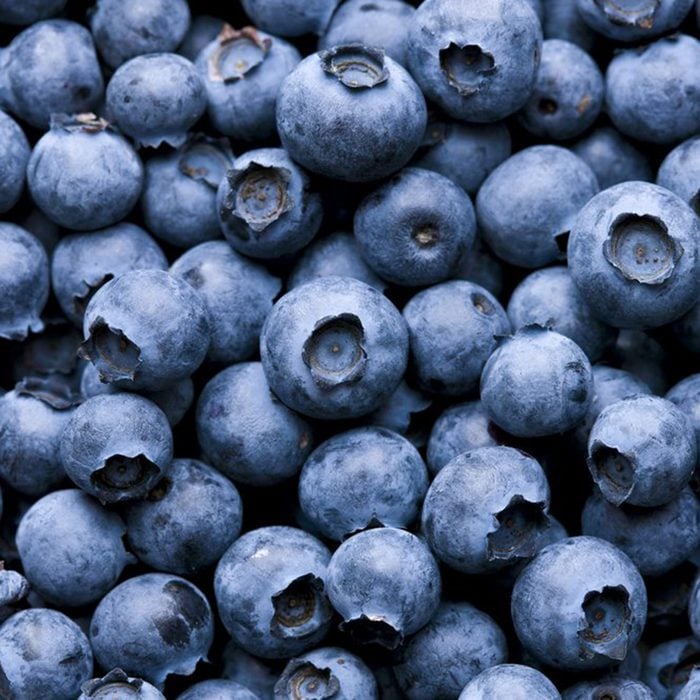
Blueberries
Almost all fruit is good for you—cherries, strawberries, mangos, peaches—yum! But these blue-hued beauties work overtime to provide you with antioxidants and vitamin C, both potent stress busters. They’re low in calories and sugar, so you can snack on them to your heart’s content without an ounce of guilt (or fat). Blueberries are also a good source of fiber, which can help relieve the cramps and constipation that can occur when you’re stressed out. From baked into biscuits to sprinkled on a salad, and even cooked into a jam, these are the blueberry recipes we can’t get enough of.
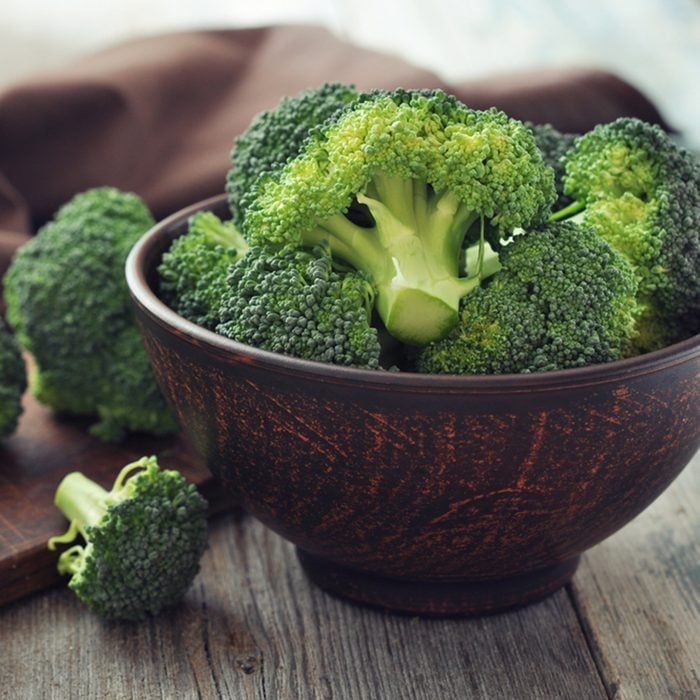
Broccoli
Broccoli is packed with B vitamins and folic acid, which has been shown to help relieve stress, anxiety, panic and even depression. Steam broccoli in the microwave or on the stovetop for a few minutes for optimal nutrition. Still on the fence? Check out the broccoli recipes even picky eaters will love.

Chocolate
Dark chocolate (at least 75 percent cocoa; 85 percent is best) is not only a stress reducer— but it is heart-healthy, too! One study, conducted by researchers at the University of Scranton, showed that eating 6 ounces of dark chocolate a day lowered bad cholesterol. And that’s not all. Another researcher found that cocoa contains phenols—antiseptic, anti-inflammatory compounds that reduce your risk of heart disease by keeping fat-like substances from oxidizing in the blood and clogging your arteries. If you don’t want to bite into a chocolate bar, here are some dark chocolate recipes you’ll definitely want to dig into.
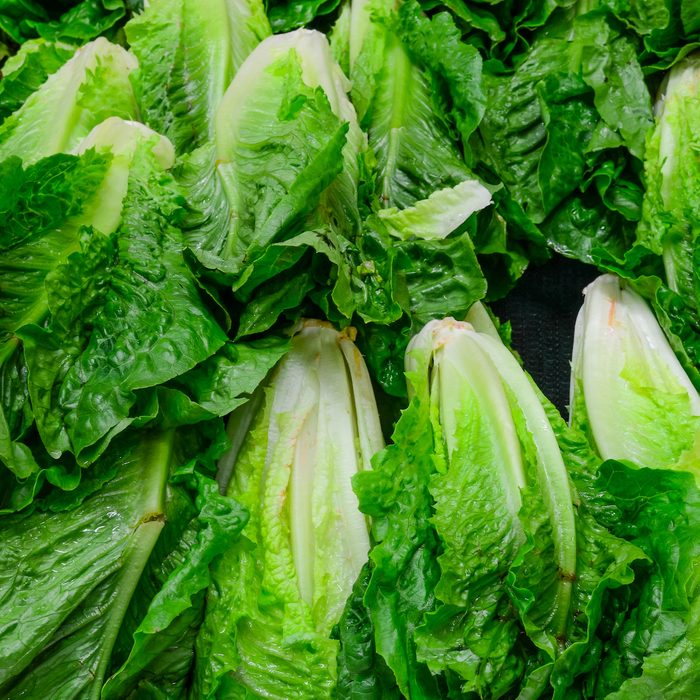
Leafy greens
Spinach, kale, dandelion greens, turnip tops and Swiss chard—they’re all amazing foods that provide iron plus lots of vitamin C, vitamin A and magnesium, both of which are excellent at helping you maintain calm. Sauté one or more type of greens with lemon or orange juice and garlic, or purée with a little low-sodium chicken or veggie broth and white beans for a satisfying soup. Check out these foods to avoid if you’re looking out for your heart health.

Lean beef
Surprised this is on the list after hearing admonitions from experts about avoiding the red stuff? Don’t be. Beef is a substantial stress buster. It’s loaded with zinc, iron and B vitamins (not to mention protein), all known for keeping us calm and happy. It is also satiating, meaning you feel fuller longer (hunger pangs can cause irritability and anxiety). Avoid fatty cuts, and stick to lean cuts like flank and skirt steak, and 95 percent lean ground beef. Or, look for cuts marked “round” or “loin,” such as top sirloin, bottom round (great for pot roast), and tenderloin—they are the kindest cuts in terms of fat content. And limit your intake to 4 to 6 ounces when you do enjoy it.
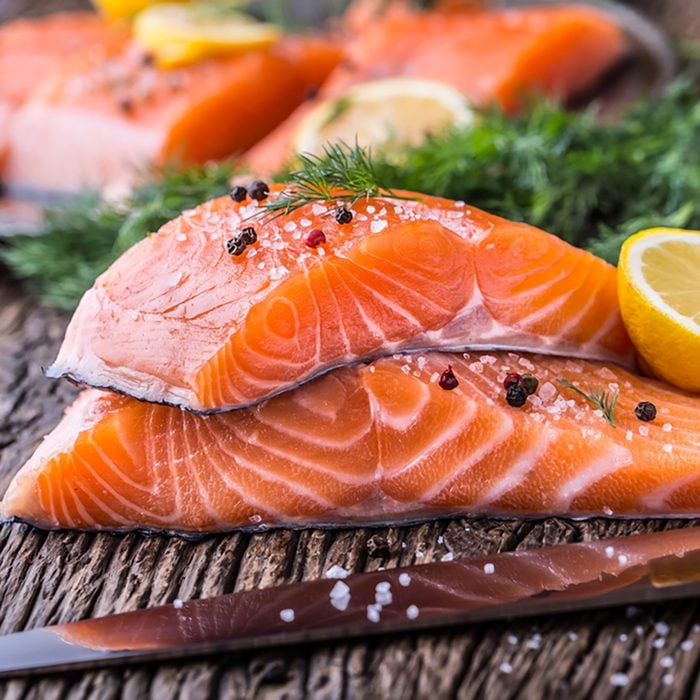
Salmon
Like many kinds of fish, salmon is loaded with B vitamins, particularly the renowned stress fighters B6 and B12. In fact, B12 is one of the most important vitamins in terms of serotonin production; a vitamin B12 deficiency can even lead to depression. Omega-3 fatty acids are also prevalent in salmon; Alaskan wild is the best; farm-raised is the least desirable.
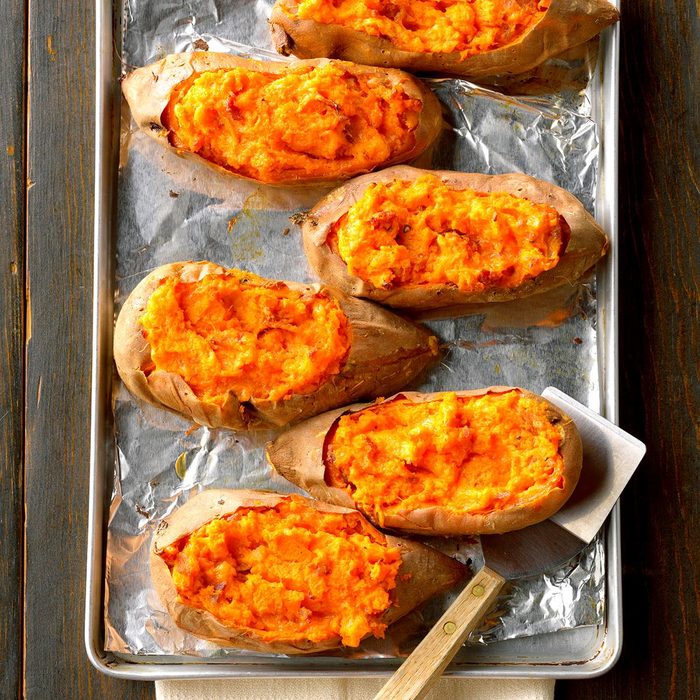
Sweet potatoes
Talk about a nutritional powerhouse! The more color a veggie has the better it is for you, according to nutritionists—and sweet potatoes might be the brightest of all. Potent antioxidants found in sweet potatoes help to shield our hearts. Plus, their sweet taste makes them delicious enough to eat for dessert. Or, take a look at these 60 savory ways to cook up sweet potatoes.
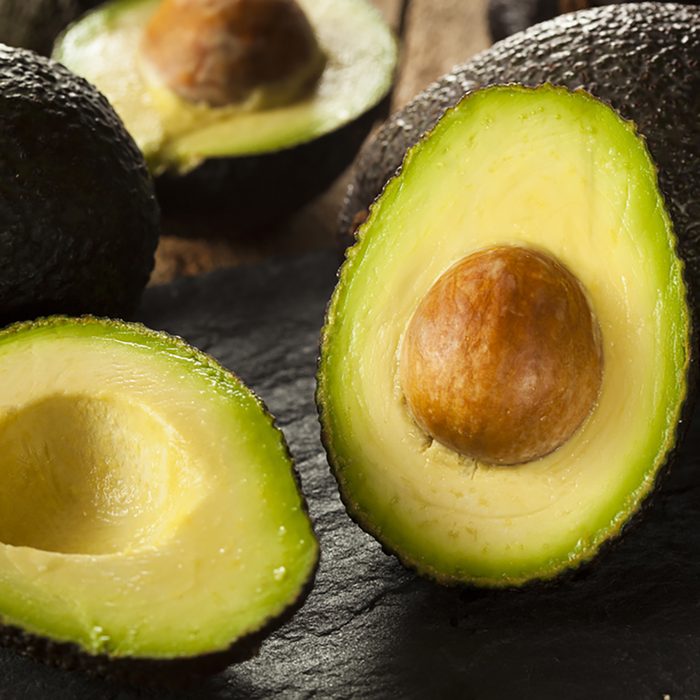
Avocados
Millennials may get teased for their love of avocado toast, but when it comes to heart health, they’re on to something. According to the American Heart Association, research shows that people who ate an avocado a day had lower levels of LDL—the so-called bad cholesterol. “Avocados are a good source of monounsaturated fat and soluble fiber,” says Tracy Severson, RD, a dietitian for the Center for Preventive Cardiology at the Knight Cardiovascular Institute, Oregon Health & Sciences University. “But they have a lot of calories, so it’s important to watch the portions.” Check out these amazing avocado recipes you should try, including avocado toast!

Bananas
Foods that are high in potassium can help keep blood pressure in check, and bananas are one of the richest dietary sources of this nutrient. A medium banana has about 420 mg of potassium—approximately one-tenth of the daily recommended intake.

Barley
Barley can be one of the best foods for your heart: a healthy whole grain high in antioxidants, vitamins, and minerals. The “can be” is because much of the barley eaten in the United States is called pearled or pearl barley, which is partially refined. The pearling process removes part of the bran layer, which means the end product is no longer whole grain and is lower in heart-healthy fiber. “Look for whole hulled barley, which has more fiber,” says Severson.
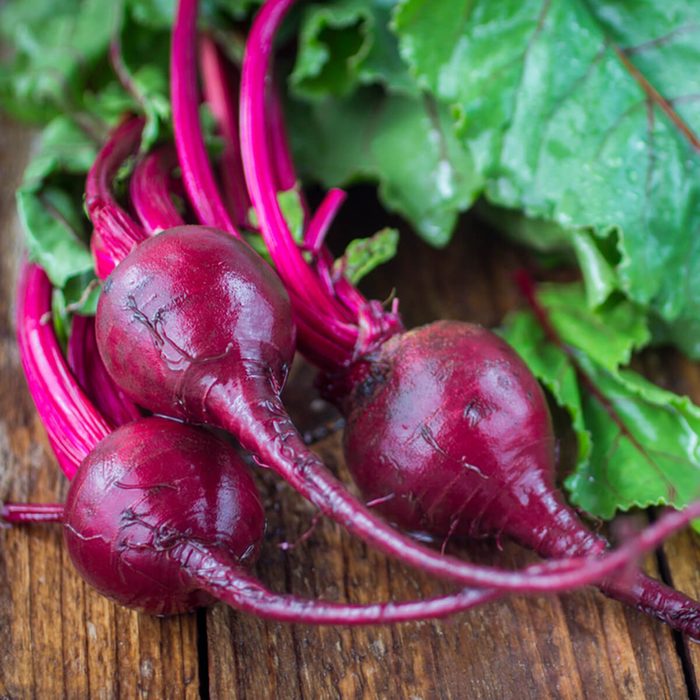
Beets
Beets are a good source of nitrates, which can help reduce blood pressure and increase exercise endurance. Beets are also full of anthocyanins, which are anti-inflammatory, and help reduce the risk of coronary heart disease. Studies have found that people who drink beet juice can lower their blood pressure and improve their exercise endurance.
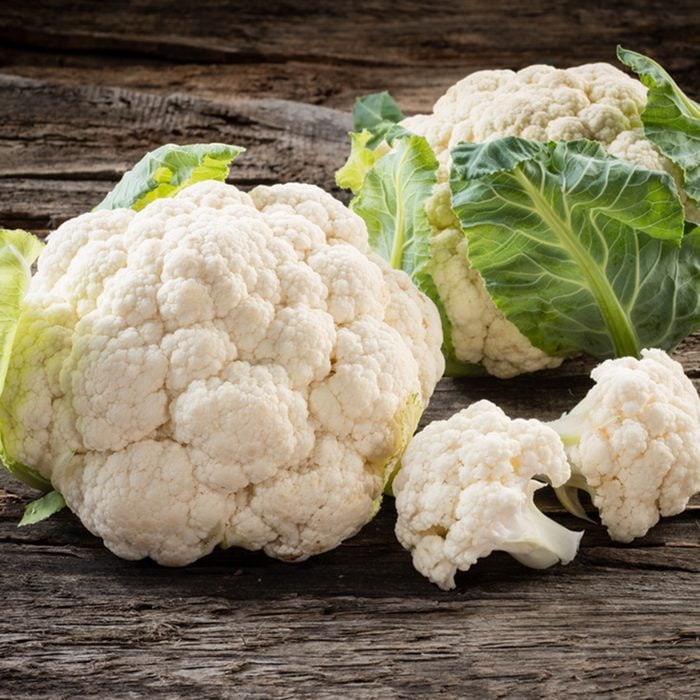
Cauliflower
Cauliflower is a cruciferous vegetable high in fiber, which can help lower blood pressure, and vitamin K, which helps boost circulation. But one caveat: Vitamin K helps blood clot, and people taking blood-thinning medication should check with their physicians about how much cauliflower is safe to eat to make sure it doesn’t interfere with a drug’s effects. “For most people cauliflower is fine, and a great source of nutrients and fiber,” says Severson. Don’t miss 25 clever ways to cook with cauliflower.

Cherries (tart)
Time to bake a pie? A study at the University of Michigan found that rats who got whole tart cherry powder mixed into a high-fat diet had lower blood levels of cholesterol and triglycerides, and lower levels of molecules linked to inflammation and disease. The rats even had less belly fat—also a cardiovascular risk factor. “Tart cherries’ bright red color comes from anthocyanins, powerful antioxidants researchers have attributed to the fruit’s unique health properties, from anti-inflammatory and heart health benefits to reduced post-exercise muscle and joint pain,” says Mitzi Dulan, RD, a nutrition and fitness expert. “Eating frozen tart cherries in smoothies, sprinkling dried cherries on a salad, or mixing dried cherries with almonds as a snack are all good ways to include these fruits in your diet.”
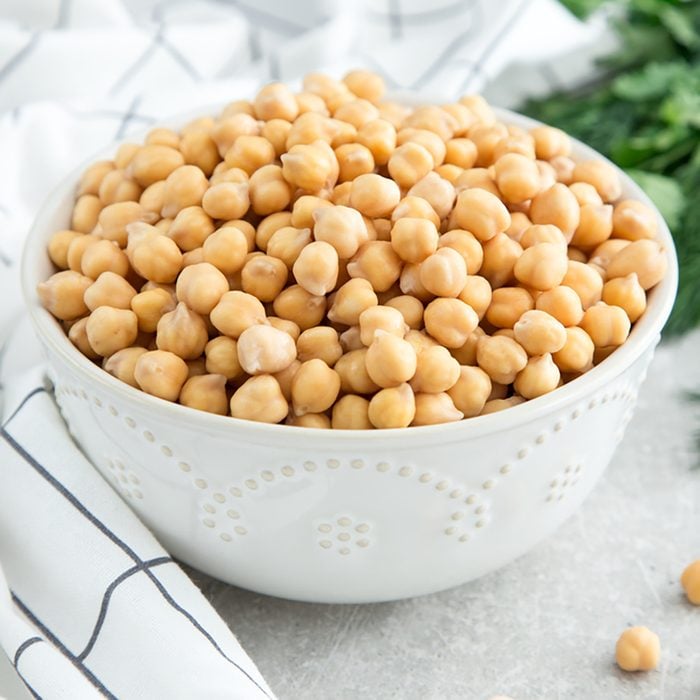
Chickpeas
Rich in both potassium and fiber, eating chickpeas can help regulate cholesterol and blood pressure. “If you eat chickpeas—or other beans or legumes—a couple of times a week as opposed to a steak or hamburger, you’ll be better off since the chickpeas are high in fiber and healthy fats,” says Alice Lichtenstein, DSc, a senior scientist and director of the Cardiovascular Nutrition Laboratory at Tufts University. Here are 40 chickpea recipes that’ll help you do just that.

Coffee
Surprised? The research and recommendations about coffee have been all over the place, with some studies suggesting the beverage is harmful to health and others claiming it’s healthy. But according to the American College of Cardiology, coffee might be helpful in reducing the risk of arrhythmias, heart disease and stroke.

Cottage cheese
It may be best known as an old-fashioned diet food (although it’s enjoying a bit of new popularity), but cottage cheese is one of the best foods for your heart, too. “Low and nonfat dairy products, like low-fat cottage cheese, are good sources of calcium and high-quality protein,” says Lichtenstein. According to the Cleveland Clinic, dairy sources like 1 percent or nonfat cottage cheese are especially important for blood pressure regulation (and bone health, too).
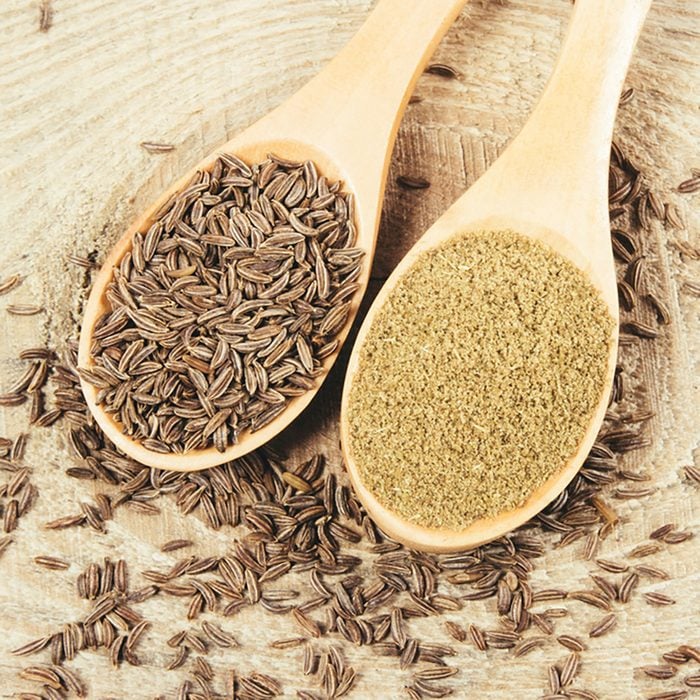
Cumin
Time for some curry in a hurry, because this spice has been found to have powerful effects on heart health. One study found that overweight or obese women who consumed just half a teaspoon of this spice daily reduced their LDL (bad) cholesterol and triglycerides, and raised levels of good HDL cholesterol, too. Be sure to check out these curry recipes with an extra dash of cumin.
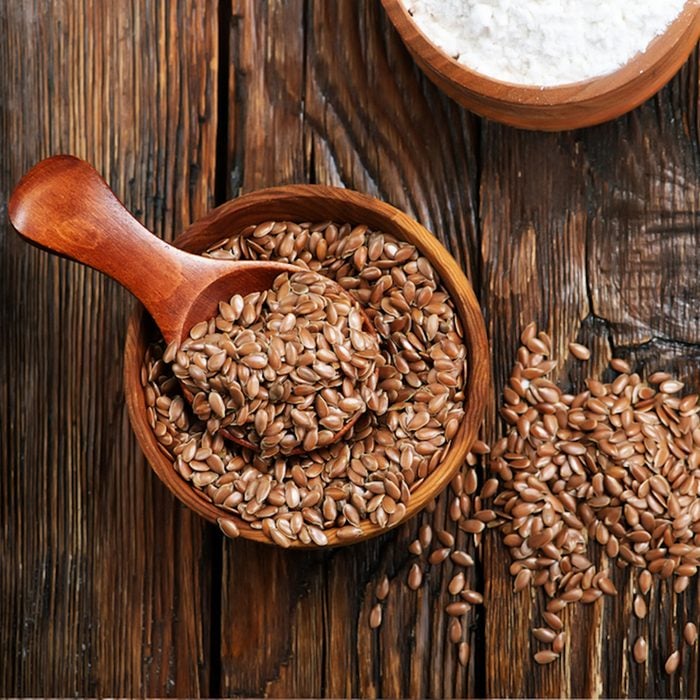
Flaxseed
These healthy seeds are a great way to add fiber to foods and are a good source of heart-healthy polyunsaturated fats, including omega-3 fatty acids. While most omega-3’s come from fish and algae, flaxseeds are one of the few good plant sources. “But with the flax, you have to make sure the seeds are ground into a meal,” says Severson. “We can’t break down the little tiny seeds on our own.”

Kamut
If you want to expand your whole-grain repertoire, kamut is a good grain to try. A small study of 22 people showed that eating kamut instead of other, only semi-whole grain products helped reduce cardiovascular risk factors like total cholesterol and LDL, and improved potassium and magnesium levels.
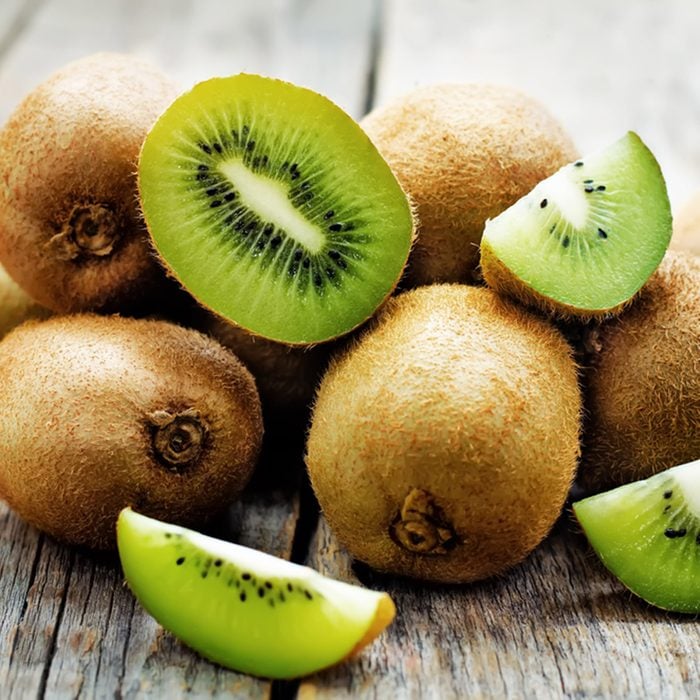
Kiwi
According to Mitzi Dulan, founder of simplyFUEL, studies show that eating two to three kiwis a day can help reduce harmful blood triglyceride levels. But even one kiwi a week can have an effect. Plus the fruit is rich in vitamins (C and E) and minerals potassium, magnesium. copper and phosphorous). It helps raise HDL—good cholesterol—levels, too.
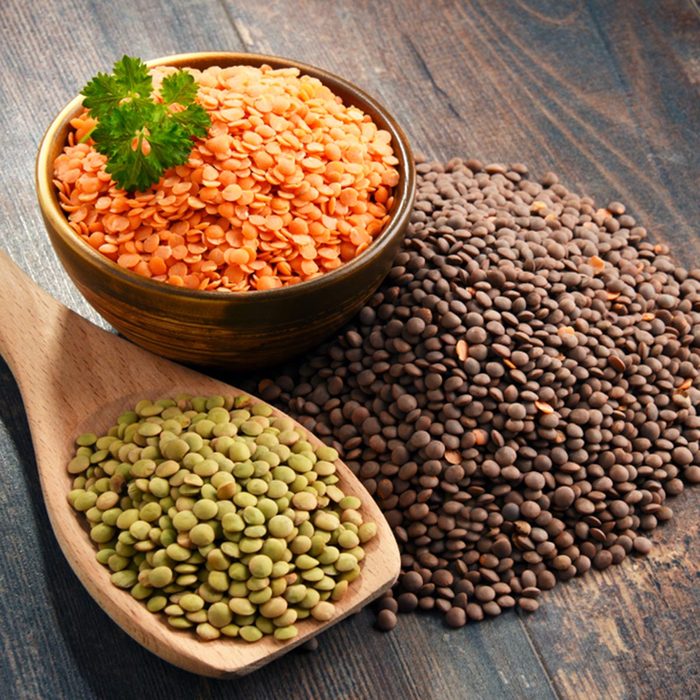
Lentils
Like beans and chickpeas, these legumes are rich in fiber and low in fat, with lots of compounds that help reduce cholesterol, making them one of the best foods for your heart. “Any sort of dried bean or lentil is a great source of soluble fiber and protein,” says Severson. “Replacing meat with plant protein gives a significant cardiovascular benefit.”
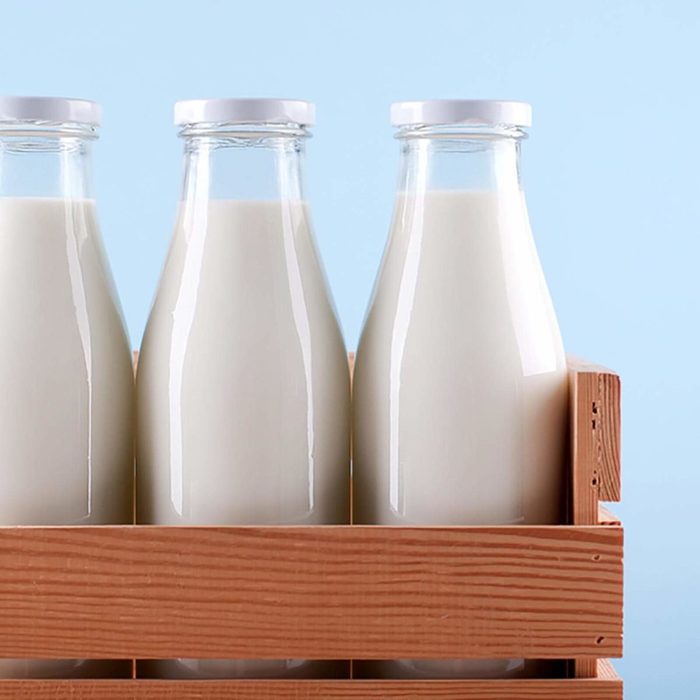
Milk
“Dairy milk is really important for blood pressure management because of the calcium and potassium it contains,” says Severson. Meaning, it’s not necessary to switch to alternative milk like oat, soy, or almond to keep your heart healthy. If you like cow’s milk, drink up! But choose low-fat products. This is how long milk will really last in your fridge.

Mushrooms
A recent scientific review of how popular foods could help your heart gave a big thumbs-up to mushrooms for their anti-inflammatory and antioxidant benefits. If you’re bored with the same white button mushrooms you’ve been slicing in your salad for years, take a look at these 50 satisfying mushroom recipes.

Oranges
“Citrus fruits are a good source of soluble fiber and vitamin C, an antioxidant,” says Severson. She explains that “antioxidants help decrease inflammation which can help with vascular function.” The potassium in oranges can help keep blood pressure at a healthy level, too.

Papaya
Switch up your healthy fruits by going beyond oranges and other types of citrus for your potassium. Papayas are another great source of this heart-healthy mineral, according to Mitzi Dulan: Just one serving provides 313 percent of the Daily Value of vitamin C, which can help to prevent atherosclerosis and diabetes-related heart disease.

Peanuts
Common peanuts are less expensive than tree nuts like walnuts and almonds, but they confer exactly the same heart benefits. Researchers looking at the diets of people in the United States and abroad found that those who regularly ate peanuts and other nuts were far less likely to have died of heart disease over the course of the study. For maximum health benefits, choose your peanuts unsalted and your peanut butter without added sugar. Don’t miss these foods cardiologists never eat.

Pumpkin seeds
The oil in pumpkin seeds is rich in phytoestrogens, which studies have found is beneficial for improving HDL cholesterol in postmenopausal women. And in animal studies, the oil was found to help lower blood pressure and protect against heart disease. Try roasting pumpkin seeds for a crunchy snack, or find pumpkin seed oil online or in gourmet stores. By the way, this is the best way to roast pumpkin seeds.

Quinoa
One of the relatively “new” ancient grains to gain popularity, quinoa is another whole grain to add to the list of best foods for your heart. High in protein and gluten free, studies show the grain can help lower cholesterol. One study comparing cholesterol in women who ate one serving of quinoa flakes a day versus those who ate corn flakes for four weeks found that only the quinoa-eaters reduced their cholesterol.

Raisins
Hungry for a snack? Reach for some raisins, which the American College of Cardiology says may be a heart-healthy way to lower blood pressure. Research presented at the ACC’s annual meeting found that people with slightly elevated blood pressure who added small amounts of raisins to their diet three times a day were able to significantly lower their blood pressure. The study didn’t try to identify which nutrient in raisins was responsible for the effect, but raisins are naturally high in potassium, a known boon for high blood pressure.
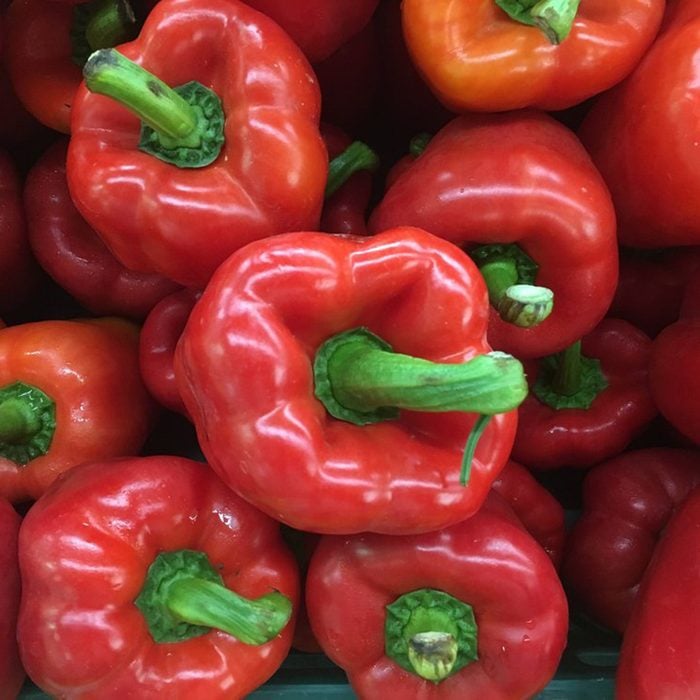
Red bell peppers
“Red bell peppers are a particularly good choice for heart health as they are full of lycopene, which isn’t found in green peppers,” says Mitzi Dulan. “They’re also a source of cholesterol-lowering soluble fiber and powerful antioxidant vitamins A and C, which are good for heart health.” Dulan adds that red bell peppers are an especially good source of blood pressure-lowering potassium, delivering a whopping 162 mg in one cup. Check out these heart-healthy meals you can cook for family.
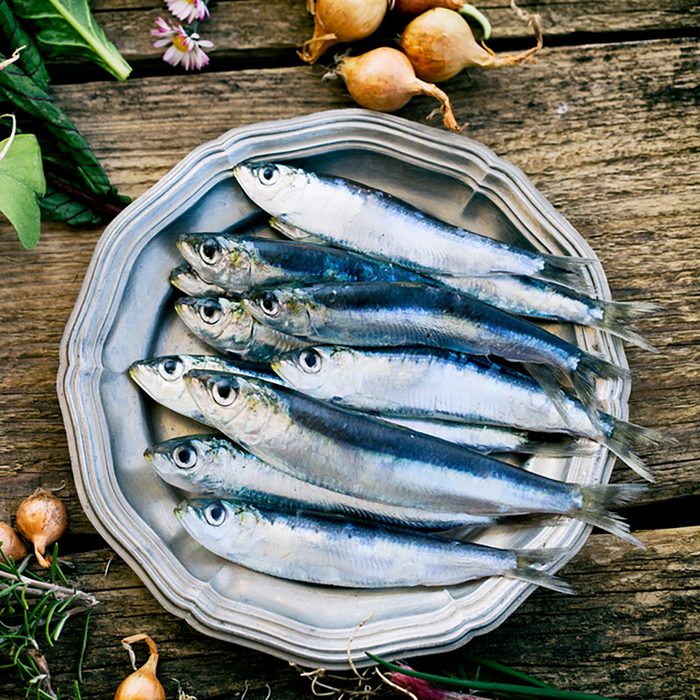
Sardines
Tuna and salmon may be among the most common fish eaten in the United States, but they’re hardly the only heart-healthy choices. Sardines—canned or grilled—are one of the richest sources of heart-healthy omega-3 fatty acids. “Sardines are so affordable, so sustainable. . . and so often overlooked as a source of omega-3s,” says Severson. Adds Lichtenstein, “It’s good to eat any kind of fish as long as it’s not battered or deep fat fried.”
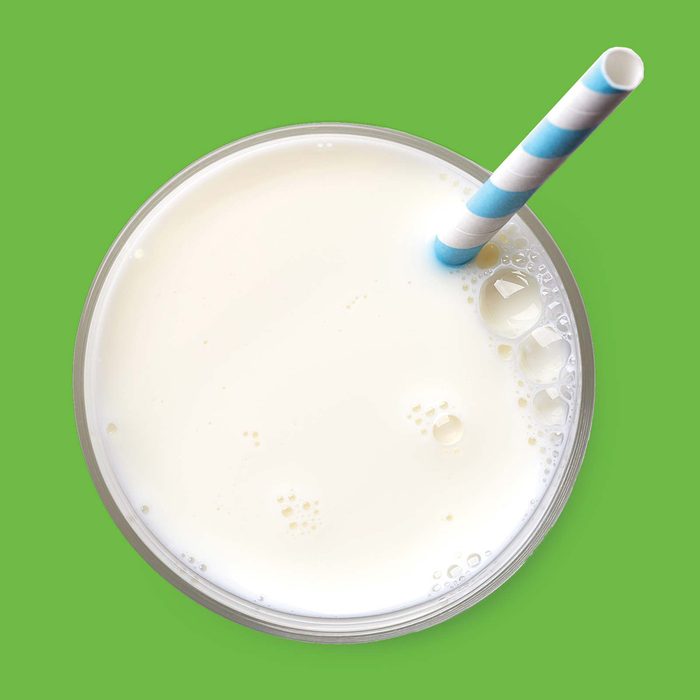
Soy milk
“For someone who doesn’t drink cow’s milk, soy milk would be my next preference,” says Severson. “It contains protein levels equal to cow’s milk, and some benefit from isoflavones.” Some analyses of research indicate that isoflavones might deliver cardiovascular benefits by improving vascular function in postmenopausal women. Severson explains that other plant-based milk like almond and oat really don’t contain protein, and the calcium they do contain has been added, “so it’s the same as taking calcium supplements.” Plant proteins are generally a good alternative to animal products. Choose soy milk without a lot of added sugar for the most health benefits.
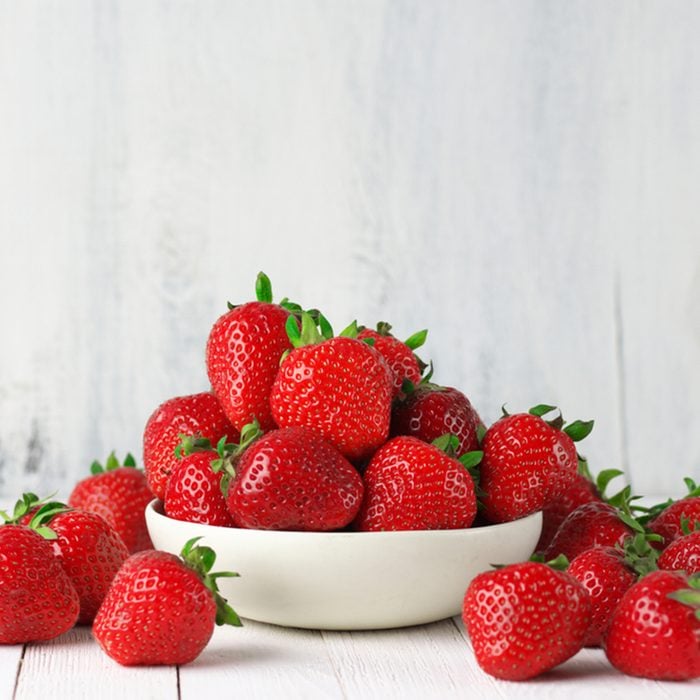
Strawberries
“Strawberries are great for cholesterol reduction,” says Severson: The anthocyanins that make blueberries blue and strawberries red are also good for blood pressure management, she explains. A Harvard review of data from the Nurses’ Health Study found that the people who ate the fewest berries were at greatest risk of heart attack, while those who ate three or more servings (half a cup) of strawberries or blueberries each week enjoyed the greatest heart benefits.

Tea
Brew a cuppa, green or black. According to the recent review of foods in the Journal of the American College of Cardiology, tea is one of the best foods for your heart. The beverage improves artery health, reverses blood vessel dysfunction, and reduces cholesterol.
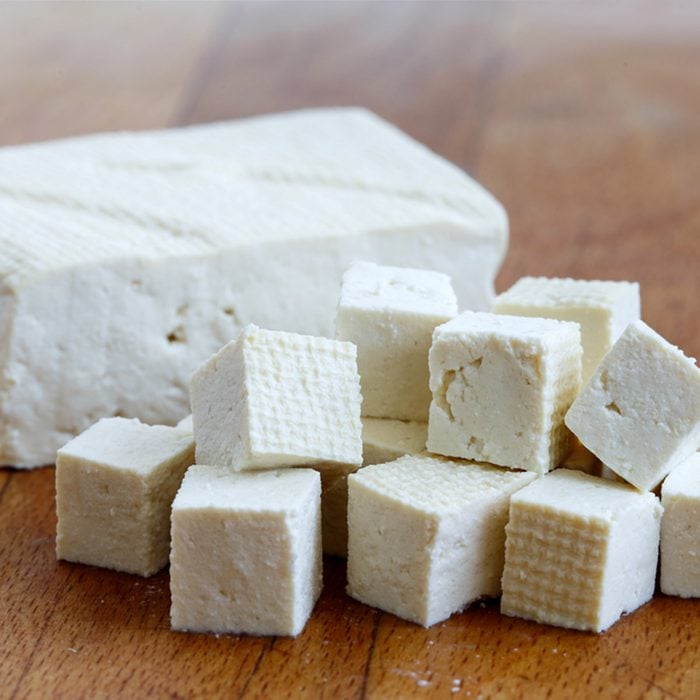
Tofu
“We used to think that soy was a little more powerful for reducing cholesterol,” says Severson; however, the new thinking doesn’t mean tofu and other soy products aren’t good for your heart. “If you’re using tofu to replace animal protein, you’re getting rid of the saturated fat from the animal. And both tofu and tempeh are also generally lower in sodium than other meat replacements.” If you’re new to tofu, these delicious recipes are a good place to start.
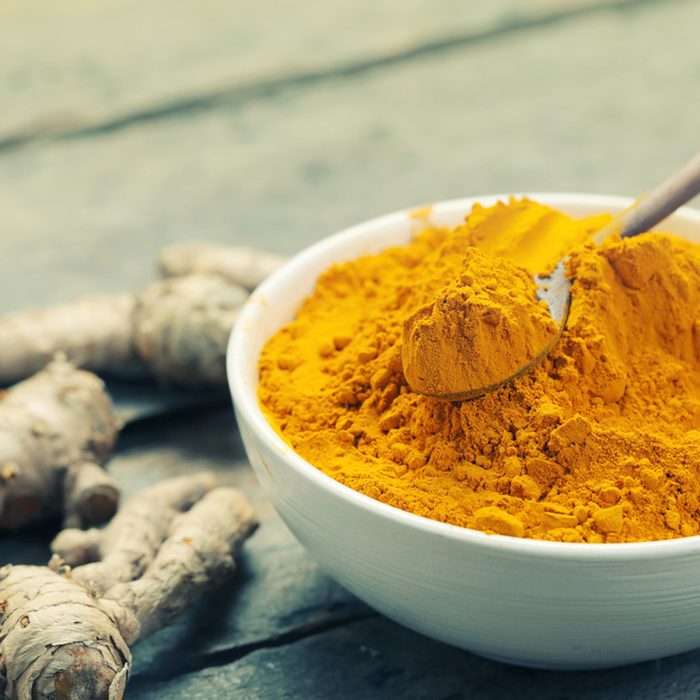
Turmeric
Curcumin, the active ingredient in turmeric, is responsible for the spice’s yellow color. It’s also the reason this spice has a wide variety of heart benefits: It’s anti-inflammatory, anti-oxidant, anti-clotting and has cardiovascular protective effects. Add turmeric to your spice rack and your food. But, cautions Severson, “you have to use a pretty hefty dose to get the benefits.” Don’t miss these healthy foods that are good for your brain, too.

Vegetable oil
Olive oil gets all the heart-healthy attention, but “soybean, canola and other vegetable oils are also excellent choices,” says Lichtenstein. Choose liquid vegetable oils rather than oils that are solid at room temperature like coconut oil. Vegetable oils are good sources of alpha-linolenic acid, an essential fatty acid that can’t be produced in the body but needs to be eaten as food. These acids have been shown to reduce the incidence of cardiac deaths, making vegetable oils one of the best foods for your heart.
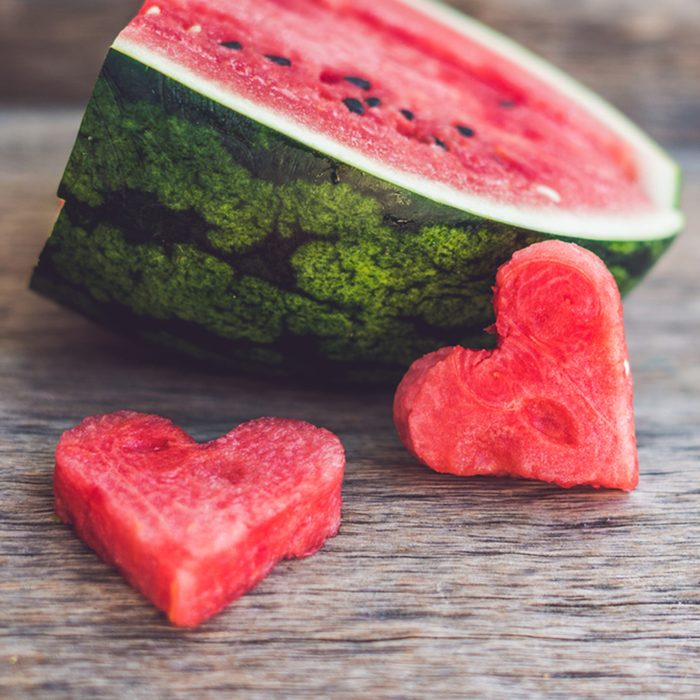
Watermelon
There’s more than water in watermelons—they’re packed with the amino acids arginine and citrulline. “These amino acids are important in regulating blood flow and promoting heart health,” says Dulan. Too bad they’re not available all year round! Next, find out 23 ways you can enjoy watermelon this summer.

Walnuts
Another powerful nut! Walnuts contain alpha-linolenic acid, or ALA, an omega-3 fatty acid that is similar to the one found in salmon and herring. A handful of walnuts a day as a snack is an easy way to get this important nutrient. Or, scatter a few on top of a salad for a satisfying crunch. Or, add some to your oatmeal along with raisins or dried cranberries for a power breakfast.

Whole grains
Cracked wheat, barley, faro, millet and quinoa are just a few of the 19 whole grains you can cook with and enjoy in all sorts of dishes. Whole grains digest slowly, keeping you feeling fuller, longer. Plus they boost serotonin levels and make you feel happy—and they brighten your mood because they’re so delicious! A half-cup serving size of any whole grain alongside a serving of veggies and lean protein should have you strolling on the sunny side of the street in no time. Follow packaging directions for preparation, but realize that most whole grains don’t require any special technique.

Oats
Oats contain a high proportion of soluble fiber, which reduces “bad” LDL cholesterol. Wake up to one of these 20 tasty oatmeal recipes to start the day off right.
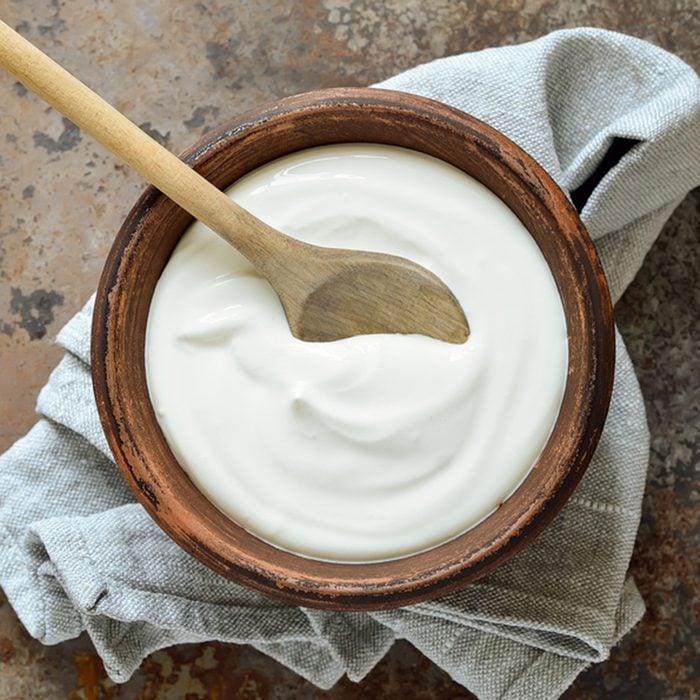
Yogurts and spreads
Yogurts and spreads containing plant sterols (similar to good cholesterol) can reduce blood levels of LDL cholesterol by up to 10 percent. Save some money at the grocery store and try making your own homemade yogurt with this how-to.
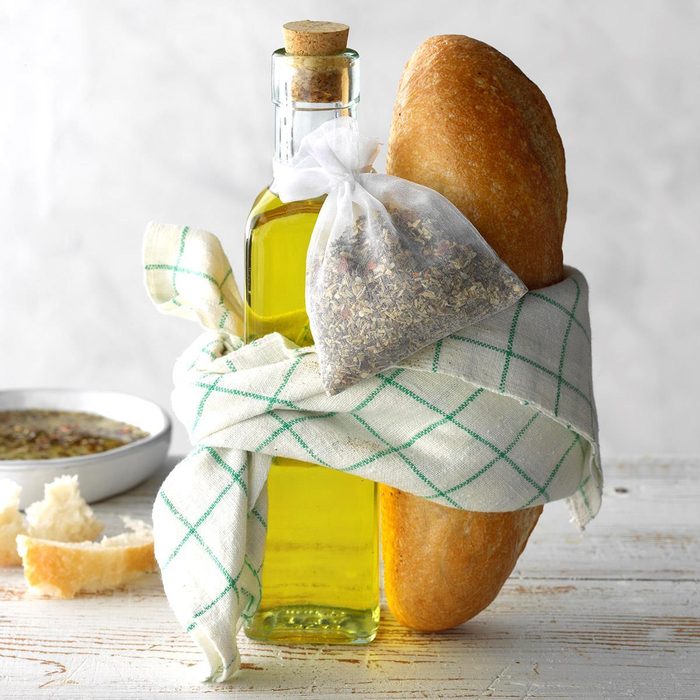
Olive oil
Olive oil is a potent mix of antioxidants that reduce LDL cholesterol while leaving your HDL cholesterol untouched.
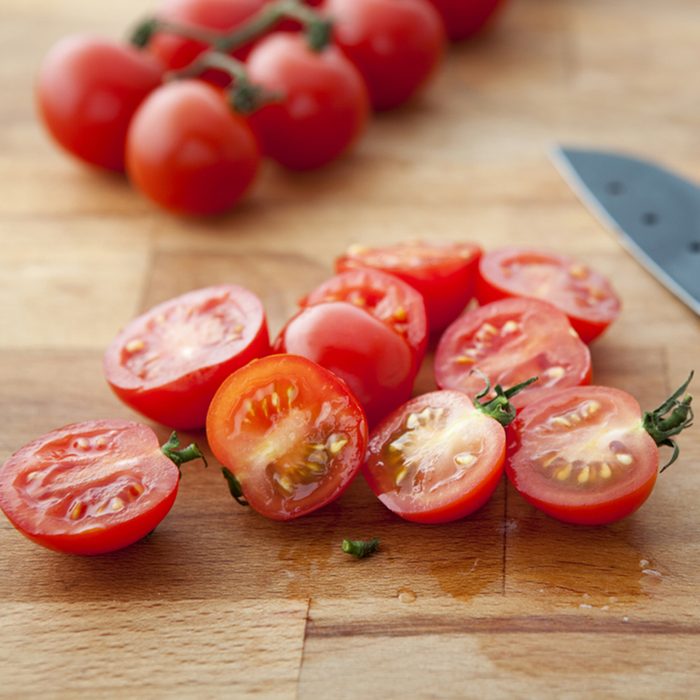
Tomatoes
Tomatoes and tomato paste are packed with vitamins and the antioxidant lycopene, which has beneficial effects on the heart.
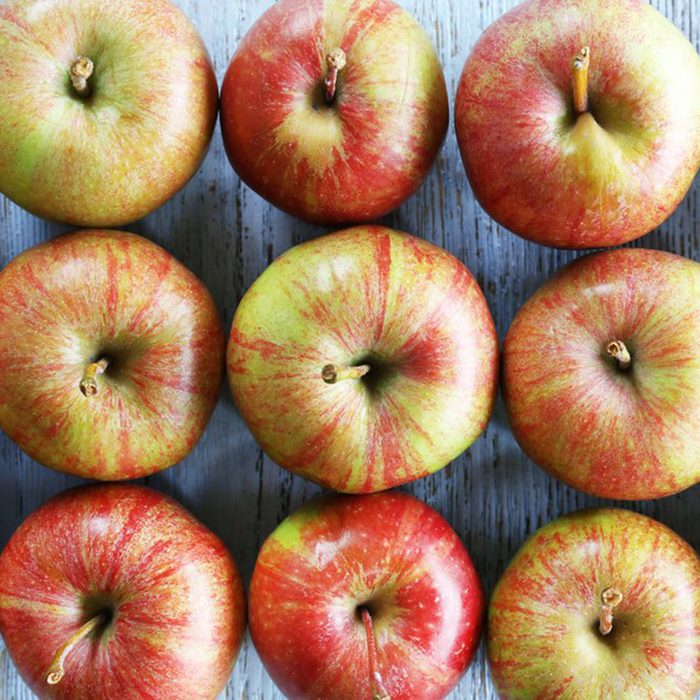
Apples
Apples contain quercetin, an anti-inflammatory chemical that can help prevent blood clots. Check out the 100 vintage apple recipes you should try today.
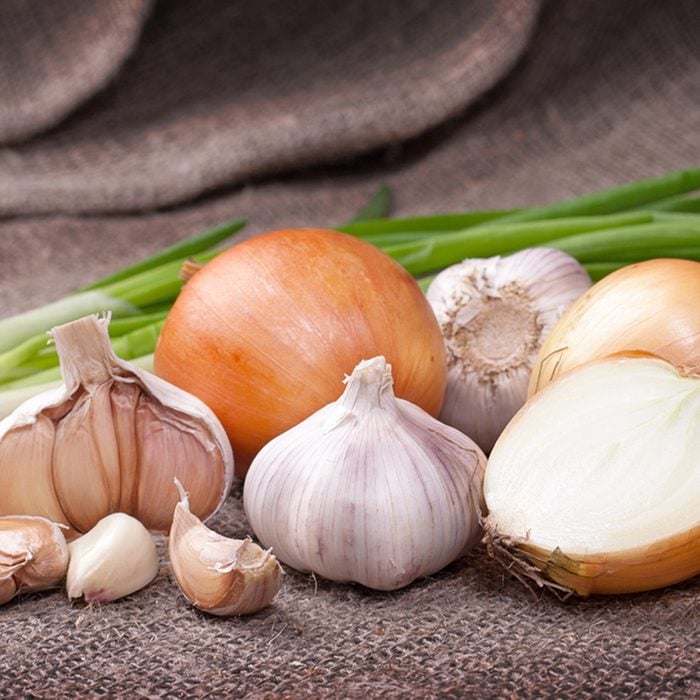
Onions and garlic
Onions and garlic help reduce blood cholesterol, as well as improving circulation and discouraging blood clotting.

Red wine
Red wine has been shown to clean up the walls of the arteries—but be careful not to exceed healthy guidelines!


















